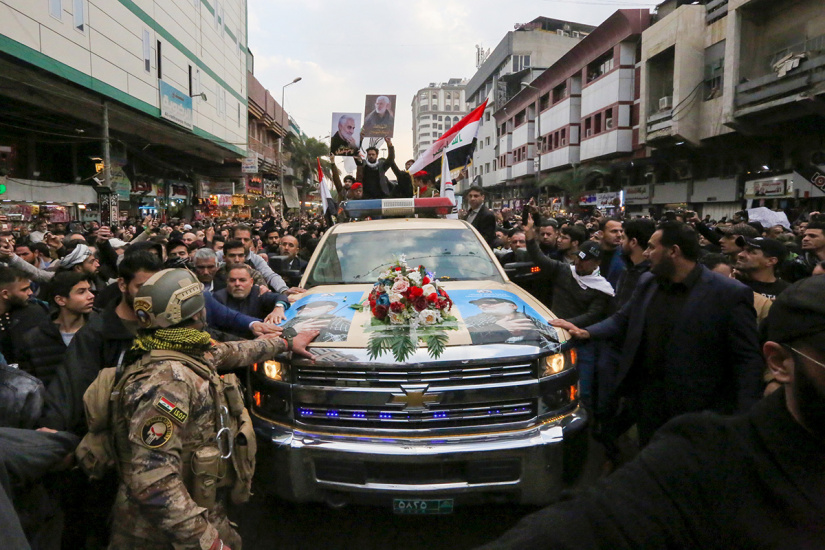Murders of Gen. Soleimani, Muhandis United Iraqis against US, Ex-American Diplomat Says

“The (Iraqi) people are now demanding the return of their sovereignty,” Michael Springmann, the former head of the American visa bureau in Saudi Arabia, said in an interview with Tasnim.
“The outrageous murders of Lt. Gen. Soleimani and Abu Mahdi al-Muhandis have again united the Iraqi people against the American occupation,” he said, adding, “Those reprehensible assassinations, in violation of the US and international law, have apparently revived nationalism and caused it to overcome the historic sectoral divisions of the country.”
J. Michael Springmann served in the US government as a diplomat with the State Department's Foreign Service, with postings in Germany, India, and Saudi Arabia. He left federal service and currently practices law in the Washington, DC, area. Springmann’s works and interviews have been published in numerous foreign policy publications, including Covert Action Quarterly, Unclassified, Global Outlook, the Public Record, OpEdNews, Global Research and Foreign Policy Journal. He has written Visas for Al Qaeda: CIA Handouts That Rocked The World and a second book Goodbye, Europe? Hello, Chaos? Merkel’s Migrant Bomb. Both are available on Amazon. The books’ website is: www.michaelspringmann.com
The following is the full text of the interview:
Tasnim: Iraqi people from all walks of life took to the streets in the capital, Baghdad, on Friday for a million-man rally to call for an end to the military presence of the United States in their country. The rally was called by senior Iraqi resistance figures, a few weeks after the parliament voted to expel American troops following an illegal US airstrike in Baghdad that led to the assassination of Iranian IRGC Quds Force Commander Lt. Gen. Qassem Soleimani and the Deputy Commander of Iraq's Popular Mobilization Units (PMU) Abu Mahdi al-Muhandis. What do you think about the massive anti-US demonstration and how do you predict its outcome?
Springmann: In my opinion, the marches called by Muqtada al-Sadr, the top Shiite cleric, and others are long overdue. The United States has had thousands of soldiers illegally and unconstitutionally in Iraq since 2003. In that year, America imposed what became an essentially corrupt and incompetent government on the country. The Iraqi people have been paying dearly ever since. The people are now demanding the return of their sovereignty. They want control of their own country again.
Regrettably, I am pessimistic about the outcome of the massive demonstrations. While they reflect the will of the people, the Americans are not going to leave. They see their armed forces in Iraq as a means of “containing” Iran and of “watching” Iran.
Tasnim: As you know, the massive demonstration and the Iraqi parliament's resolution calling for the expulsion of the foreign forces from the Arab country have called into question the legitimacy of Washington’s military presence in Iraq. Do you think that the Iraqi administration would finally be forced by the people and the parliament to expel the foreign troops?
Springmann: Certainly the Iraqi parliament will eventually be forced to pass a binding resolution, rather than the non-binding one already done, demanding that the US military leave the country. And I believe that the Iraqi administration would make representations to the Americans to go home. However, US armed forces will not leave. They know that the Iraqi military is not strong enough to force them out. The American attitude is that their soldiers are in Iraq for the “good of the country”, a remarkably twisted outlook.
While some have estimated the crowds demanding expulsion of the occupation forces at 2.5 million, a goodly number, I do not believe that they are enough to really force the hand of the Iraqi administration into taking effective action. US Secretary of State Mike Pompeo has indicated that the soldiers are staying. And the Pentagon reversed itself, stating that the American armed forces will not be withdrawn.
Tasnim: What do you think about the impact of the US move to assassinate Lt. Gen. Soleimani and revered commander Abu Mahdi al-Muhandis on the unity of the Iraqi people and their call for the expulsion of the American troops?
Springmann: The outrageous murders of Lt. Gen. Soleimani and Abu Mahdi al-Muhandis have again united the Iraqi people against the American occupation. Those reprehensible assassinations, in violation of US and international law, have apparently revived nationalism and caused it to overcome the historic sectoral divisions of the country. A united Iraq is in a far better position to demand the removal of American forces.
One effect of this has been to revitalize Iraq's military. In fact, members of the Iraqi armed services, such as Hadi Al-Amiri, have called on all national forces in the country to unite against the US, according to the Anadolu Agency. Al-Amiri is the commander of the Badr Organization affiliated with Hashd al-Shaabi —known also as Popular Mobilization Units (PMU), part of the Iraqi army.
If this trend continues and spreads, Iraq will be forced by its own people to move politically and forcefully against the American occupation. But the trick is to create such an international groundswell against the US control of Iraq that the Americans will have to leave. They have enough power and money to resist the country's call to leave.
Source: Tasnim

